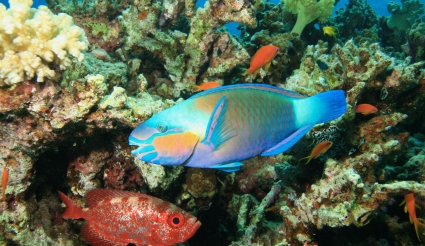What's Happening at Discovery Diving
Get all the latest info from our Instructors and Staff on our SCUBA Classes, Charters, Equipment and Special Events.
Fish mucous cocoons: the mosquito nets of the sea
- Font size: Larger Smaller
- Hits: 1743
- 0 Comments
- Subscribe to this entry
- Bookmark
It is well known by SCUBA divers that many parrotfish and wrasse sleep soundly in mucous cocoons during the night. Until now the reason has not been known, but has been thought to be some sort of protection against predators. New research by scientists at the University of Queensland, Australia has found that the cocoons actually act as a kind of “mosquito netâ€.
Fish are a target for external parasites that feed on their blood, much as mosquitos feast off humans. During the day fish can visit “cleaner stations†where cleaner wrass remove the parasites (gnathiids). But are the parrotfish are vulnerable to attack during the night?
The scientists exposed the coral reef parrotfish Chlorurus sordidus with and without cocoons to gnathiids overnight. Fish without mucous cocoons were attacked more by gnathiids than fish with cocoons. The cocoon acts as a mosquito net. It takes little energy for the fish to construct and is an efficient adaptation for preventing parasite infestation that is not used by any other animal.
Cocooned parotfish are a popular sight on night dives. Dr Lexa Grutter, from UQ’s Centre for Marine Studies, said while most fish guide books and biology textbooks presumed mucous cocoons protected fish from nocturnal predators such as moray eels, no experimental studies had examined their function.
“At night, when cleaner fish sleep, mucous cocoons act like ‘mosquito nets’,†said Dr Grutter, “allowing fish to sleep safely without being constantly bitten, a phenomenon new to science.â€


